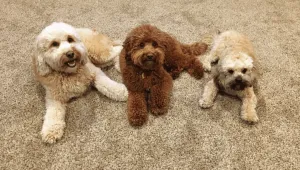There is a lot of debate over whether you can train a dog without a trainer.
Some people believe that it is essential to have a professional help you teach your dog the basics, while others claim that with enough patience and proper instruction, anyone can do it.
So, which side is right? Well, the answer is…it depends.
Teaching your dog basic obedience commands can be done without a professional, but more complex behavioral issues may require the help of an expert.
Whether or not you decide to hire a trainer, always make sure to do your research and find one who uses positive reinforcement methods.
Table of Contents
ToggleContents of this article:
- Should I train my dog myself or get a trainer?
- The importance of using positive reinforcement techniques.
- What do you do when your dog doesn’t listen?
- When to seek professional help for your dog.
- Is it good to send your dog away for training?
- Tips for success.
Should I train my dog myself or get a trainer?
The basics of dog training.
Training a dog can seem like a daunting task, but it doesn’t have to be. By understanding the basics of dog training, you can establish a good foundation that will set your furry friend up for success.
First, it’s important to use positive reinforcement to reward good behavior. When your dog does something you want them to do, give them a treat or praise them verbally. This will let them know that they’re on the right track and encourage them to continue behaving in that way.
Second, have patience- this is not a process that will happen overnight! Be prepared to commit time and effort to training sessions on a daily basis.
And finally, don’t forget to have fun! Training should be enjoyable for both you and your dog. By following these simple tips, you’ll be well on your way to being a great trainer- and having a well-behaved pup.
How to train your dog without a professional trainer.
There are lots of resources available online to help you train your furry friend, you just need to be careful who to follow.
A quick Google search for “how to train a dog” yields millions of results, but not all of them are created equal. It’s important to find sources that use positive reinforcement techniques, as well as avoiding those that recommend using punishment or force.
Once you’ve found a reputable source, take some time to learn the basics of dog training. As we mentioned before, positive reinforcement is key- so make sure you have plenty of treats on hand to reward your pup for good behavior.
There are great value, self-paced online courses available from Spirit Dog Training and Canine Principles.
And remember to be patient – training takes time and consistency, but it will be worth it in the end!
The importance of using positive reinforcement techniques.
Positive reinforcement is one of the most important aspects of dog training, and it’s crucial that you use this method correctly.
When your dog does something you want, say “good and give them a treat. This will help them understand that they are doing what you want and encourage them to do it again.
It’s important to avoid using harsh punishments, such as scolding your dog or hitting them. This will only serve to confuse and frustrate them, and it won’t help them learn the desired behavior. It may even make them scared of you.
Stick with positive reinforcement, and you’ll be well on your way to a well-trained pup.
Check out this post for information on how to train your dog using marker words.
What do you do when your dog doesn’t listen?
There are a few things you can do when your dog isn’t responding to training.
First, make sure you are being consistent with your commands and rewards. Dogs need time to learn, so be patient and keep at it.
If you feel like you’re not making progress, seek out the help of a professional trainer. They can help troubleshoot the problem and come up with a plan to get your dog back on track.
When to seek professional help for your dog.
There are certain behaviors that are best left to be handled by a professional, such as aggression or severe separation anxiety.
If you’re struggling to train your dog on your own, it might be time to seek out the help of a professional. Look for a trainer who uses positive reinforcement methods, and make sure you’re comfortable with their techniques before moving forward.
With the help of a trainer, you’ll be able to get your pup back on track in no time.
How to find a reputable trainer.
If you’ve decided that you need to hire a professional trainer, the next step is to find one who is reputable and experienced. Ask your friends or family for recommendations, or look for online reviews.
Once you’ve found a few trainers you’re interested in, set up consultations to get a feel for their methods and personalities.
Ask them the three questions that world renowned canine expert Jean Donaldson recommends, which are:
- What happens when the dog gets it right?
- What happens when the dog gets it wrong?
- Are there any less intrusive methods available?
It’s important that you find a trainer you’re comfortable with, as this will make the training process much more effective.
Is it good to send your dog away for training?
I would never recommend sending your dog away for training as the human half of the partnership needs to understand how to manage the dog’s behavior to keep it on track.
Dogs do not generalise very well and having someone else train your dog could mean that your dog only responds to that person and does not respond to you when you ask it to do the same thing.
Finally, I have know dogs to return from residential training completely traumatised and with serious behavioral issues because of the way they were treated whilst away from home.
It is much better to train your dog yourself or seek out the help of a reputable trainer who can come to your home and work with you and your dog together.
Can you train a dog without a trainer? Tips for success.
Here are a few final tips to help you be successful in training your dog:
- Be consistent with your commands and rewards- this will help your dog understand what is expected of them.
- Make sure training sessions are short and sweet- dogs have shorter attention spans than humans, so try to keep things brief.
- Be patient! Training takes time and patience, but it will be worth it in the end.
With these tips in mind, you’re well on your way to being a successful dog trainer. Good luck!







